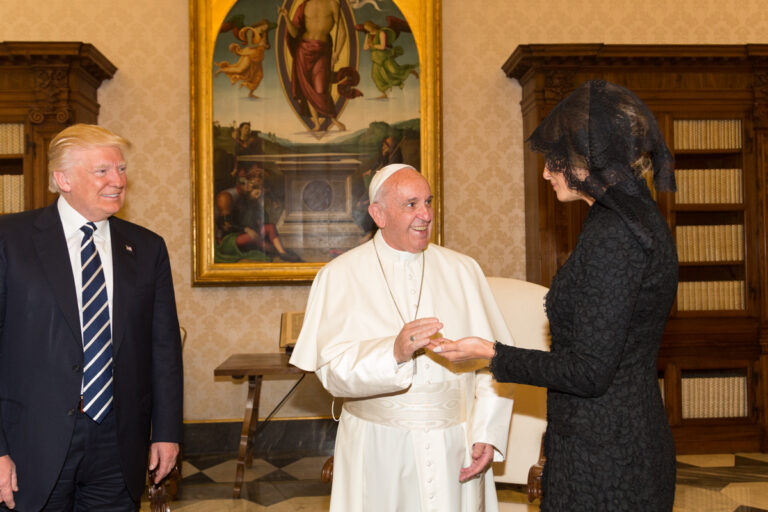
Law from Below: How the Thought of Francisco Suárez, SJ, Can Renew Contemporary Legal Engagement
Elisabeth Rain Kincaid
The following is an excerpt from Elisabeth Rain Kincaid’s new book, Law from Below: How the Thought of Francisco Suárez, SJ, Can Renew Contemporary Legal Engagement. Excerpted with permission from Georgetown University Press, 2024.
Often in American civil discourse, we return to the belief that law is imposed only from above, with its authority and existence depending upon its promulgation and enforcement by the nation-state. As a result of this wide-spread presumption, many people committed to working for legal justice believe that their only options for constructive engagement with law are limited to either taking control of the legislative process through the ballot box or resisting law’s authority through acts of civil disobedience. In my book, I argue that this understanding of law as imposed only from the top down has resulted in a limitation in the Christian political imagination of the potential ways in which ordinary people may work to promote justice through incremental, every-day improvements of the law – as opposed to working from above or against the law to effect changes. To provide this reconceptualization, I engage in a constructive retrieval of the tradition of jurisprudence from below as articulated by the Spanish baroque scholastic, Francisco Suárez, SJ. Drawing upon the medieval legal and theological tradition, Suárez presents a more complex theory of law than many of our present day conceptions, one which acknowledges the importance of promulgation by a ruling authority, but also natural law, popular custom, and reception and interpretation by communities and individuals as sources for law’s actual substance. In Law from Below, I explore both the historical and theological roots of Suarez’s theory as well as providing case studies from contemporary American legal engagement illustrating how his understanding of law from below might contribute to contemporary legal engagement.
The Authority of Custom
Suárez addresses the question of the authority of custom in civil society by recognizing both the importance of the lawgiver and the role of the people in establishing any form of law, including custom. Suárez claims that God has given each perfect community the power to create law—either through statutes or custom. Almost every community, for its own more efficient government, delegates to a legislative authority various degrees of power to make statutory law. However, no matter how total the authority of the ruler may be, the “legal right” to establish law through custom can never be fully transferred away. Any community that possesses the capacity to receive law also always possesses the capacity to establish law through custom. Therefore, each community can introduce a legal custom exactly in relationship to its capacity to receive law—as long as the custom receives the tacit consent of the lawgiver.
In his emphasis on the importance of the lawmaker’s tacit consent, Suárez shows that, like Gratian, he does not seek to eradicate the legislative authority’s role.The chaos of the eleventh century had demonstrated that some form of central authority was needed to avoid chaos and corruption. However, where Gratian believes that legislative authority can eventually overrule custom, Suárez affirms the equally important roles of the lawmaker and the people. The proximate cause of custom’s establishment as law is the people who create the custom through their acts. The primary cause is the sovereign power, exercised through tacit consent. Both powers are necessary for the custom to become law, and accepting one does not require denying the other. Suárez draws on Aquinas for support for this position. Aquinas writes that custom can be established either by a commonwealth, in which the people have retained sovereign power, or through the ruler’s tacit consent to the custom. Suárez interprets this to mean that upholding the people’s authority to establish custom does not mean a rejection of legislative authority.
Suárez explains how these two powers are complementary when he considers how custom can abrogate law. Does saying that custom can abrogate law really mean that laws are not enacted unconditionally, and only with the proviso that the people have to accept them for them to possess any force? Suárez rejects this claim: law cannot depend for its authority upon the acceptance of the people, since this would mean that law had no intrinsic power and maintaining its authority is subject to the people’s whim. Rather, the power to enact a custom that can abrogate an existing law results from the union of power between the lawgiver and the subjects. The people have the power to factually establish a custom, and custom is completely formed into law when the ruler has decided to “tolerate and give consent to the popular will.” Thus, rather than choosing one party or the other, Suárez claims that the power to abrogate law through custom results from a union between the people’s factual power to advance a different law and the ruler’s legal power to confer implicit consent through toleration, with both leading to annulment. The people’s power does not depend on how much legislative power the people retain for themselves, since “this act of repudiating law by custom is not one of jurisdiction, or of public authority, but it is rather one that proceeds from those under a duty of obedience to the law.”

Suárez supports the claim that the people have an intrinsic power to make law through custom by considering two factual examples. Within the Church, lay people, who lack any legislative power, are still able to establish customs of worship that bind with moral authority and even abrogate ecclesiastical ordinances. This is exactly what has happened; Suárez argues, in the acceptance of infant baptism and lay communion under one kind as a rule in many churches. Within a civil community, merchants functioning as a perfect community with respect to commerce may, with the ruler’s consent, establish a custom that stands in as “statutes of a quasi-municipal character.” This example is one that most modern theorists skeptical of custom as law would find hard to deny, considering that the United Commercial Code itself developed out of customary mercantile law, and custom continues to inform much of international law related to trade.
In a certain sense Suárez seems to be making a similar argument to Hart. It would be possible to read Suárez’s argument as claiming that the people’s authority is sufficient to establish a primary rule, but the legislative consent, given through a secondary rule, is actually necessary to make the rule into law. This reading would miss the full force and significance of Suárez’s view of custom. It is the practices of the people that provides the initial power to make law. The consent of the ruler is also necessary, but only when the two powers are combined can custom become law. Thus, custom serves as a constant reminder of where true power lies, and it can function as a check on the power of the executive, rather than the other way around. Suárez offers a more thoroughly grounded and developed version of Postema’s view of law as created by interaction, without sacrificing the insights from his own cultural context, that legislative authority is important for maintaining a functioning and efficient legal system. It is the people and the ruler, interacting together, who are able to give custom the proper moral force to become law.
Suárez is anxious to establish custom as a source of law whose authority is equal to statutory law, in the same way he seeks to make the people and the ruler mutually complementary sources of authority, Where Gratian ultimately subordinates custom to written law, Suárez makes them equal and capable of coexistence. Suárez emphasizes this point in responding to the claim of jurists who argue that customs that have been encoded in statutes by one in authority to make laws cease to count as a custom (since they are no longer authorized by the tacit consent of the people, but rather by the express command of the lawgiver). It is true that custom is usually unwritten and typically introduced “by usage.” However, while custom is normally unwritten, this is not always the case. Customs that are sufficiently established in action and then later written down as laws may still retain their separate authority as customs. In these situations, the law’s authority stems from “two obligations [vincula] simultaneously—that is, of custom and of written law,” in the same way that the same action might be mandated by two different statutes.” The two sources of authority do not fuse, but operate together, alongside and strengthening each other. Thus, custom “retains its own force and the essential character of custom, unless it is abolished by a special written statute.”
Suárez draws this argument from both jurists and canon lawyers. A number of jurists make the claim that custom retains its own force and essential character unless it is abolished by a special written statute. In canon law, this claim is demonstrated by the fact that customs established by the apostles have been written down in canon law. These customs do not lose their apostolic authority simply because they have been recorded and promulgated in the laws of the Church. Rather, the recording in canon law “adds new force to it; and, as the Gloss on that law observes, from being a particular custom it thus becomes a common law.”
In making this argument, Suárez presents a more authoritative view of custom than even a modern advocate of viewing law as custom, such as Fuller, might make. Fuller, like Gratian, believes that custom can become law only where a lacuna exists. However, Suárez claim that custom continues to maintain its obliging power, even with the existence of a subsequent written law, actually prioritizes custom even over legislative enactments.
The Morality of Custom
The question of whether a custom can be morally evil is as crucial for Suárez and his contemporaries as it is in our own day. Suárez distinguishes two questions related to this category: Is the custom good or bad?; and Is the custom reasonable or unreasonable?
The first question is one of morality. Customs that are simply repetitions of the natural or divine law are always customs of fact. Of course, these customs are morally beneficial, since they are useful for “adding strength (so to speak) as far as we are concerned, to the natural law, by keeping fresh its memory and by facilitating its observance on the part of the whole community.” But they do not establish new law. Customs that contradict the natural or divine law are by definition evil, so therefore they cannot generate the moral force to become customs of laws.
However, the natural law, according to Suárez, does not regulate every category of moral action. While there are some acts that are strictly prohibited by natural law and some that are rigorously enjoined, many other acts are unregulated. These other acts might have natural law requirements as to “mode or precise character” if and when they do occur but they are by no means mandated by the natural law as to absolute performance. This leaves a large swath of human life that is underdetermined by natural law. If some customs developed for one particular context constitute “some usefulness essentially good, some law might be introduced through them as custom, or at least human law abrogated.” For example, the price of any specific good, unless it is exorbitant, is not intrinsically moral in its nature. However, in order to ensure something useful in the community—perhaps that a staple is within the financial reach of all purchasers—custom might set the price at a certain level.
Suárez considers some important circumstantial limits on the people’s ability to give consent. He rejects the claims of several jurists who uphold the authority of a custom that has been introduced through error regarding subject matter. In response, he argues that error precludes the introduction of custom into law because error makes it impossible for the people to consent to a custom becoming law and, for this reason, the law is not based on right reason. This holds whether the error pertains to a falsely presumed legal obligation or erroneous consent as to facts of action. So, for example, if people limit their own rights because they misunderstand their rights under the law, their actions cannot mean that they establish a law to their own detriment, since they were only consenting through error. In the same way, custom cannot be established by acts performed through compulsion or out of fear, which remove the element of intention necessary for establishing custom. As Murphy points out, this exclusion of customs enforced by fear or coercion removes all possibilities that customs of exploitation and domination can become law—the very types of pernicious customs that section 1983 intended to exclude from possessing legal authority.
Suárez considers reasonableness as one requirement that is supplemental to the requirement of goodness. In this he takes account of the cultural contingency and specificity that particularly distinguishes custom as law. A custom may be good but also unreasonable for a certain culture at a certain time. The question in determining this is one of “fittingness.” An unfitting custom, while not evil, might create negative “moral effect” or an “element of danger, or possibilities for harm if it should be introduced into common public observance; and this, despite the fact that it is neither evil in itself, nor forbidden by any positive law.” For example, although a custom of daily mass attendance is unquestionably good, to perceive such attendance as a law-creating custom would be clearly unreasonable because it would create an obligation that would be imprudently burdensome if it were established by a positive law.
However, there are two objections to this understanding of custom as capable of abrogating law that Suárez must address. First, any valid law by definition is not unjust. Therefore, could a custom that opposes a just law be capable of having a good subject matter? After all, “in general, the revocation of a just law without cause is unreasonable.”‘ Suárez answers this question by stating that simply because a law is just does not mean it cannot be abrogated. Rather, the question becomes, which law is better? In order to abrogate an existing law, a custom can be justified by showing that some reasonable cause exists explaining why it would be better than the existing law. As long as the custom, if it were law, meets the conditions of subject matter necessary for justice, then it has passed the subject matter requirement, even if the law it opposes is also just.
Contrary to our intuition perhaps, Suárez sees far less conflict around the requirements of the subject matter for custom abolishing a law than the requirements for the subject matter establishing a law. The standards for the subject matter establishing law are much stricter as far as utility and rectitude are concerned. As far as abrogation, however, “it is enough that the annulment of the obligation in question be not contrary to the public advantage, since, although some advantage is taken away, there is a corresponding compensation, either in the removal of an occasion of a greater evil, or in conciliating the minds of subjects to milder government.” Although the standard is lower, there must be some reason to justify the repeal of a just law. It is not enough that the custom is not opposed to divine law or natural reason; there must also be a good reason to remove the law.
Suárez also considers whether human law’s prohibition of the actions constituting a custom make the subject matter of the custom intrinsically evil. He does agree that the initial action establishing the custom is evil in that it goes against the law. However, it is not essentially evil, since “human power and will” can remedy the situation, either through making the custom into law or withdrawing the prohibition against the action. Under this logic custom can only be intrinsically evil if it is contrary to natural or divine law. A second question regarding subject matter is whether a custom can be reasonable if it abrogates a law that is itself reasonable. Suárez’s solution is that the abrogated law should be understood to be replaced by a custom “that may be reasonable under other aspects, which are also good and fitting.” Even the good and reasonable may be improved upon and adapted to better serve in a changing circumstance.
In considering this requirement, Suárez is obviously drawing upon the rich heritage of reflection from the scholastic approach to custom. He addresses concerns regarding the introduction of bad customs by definitively stating that a custom cannot contradict the commands of the divine law or the natural law, However, beyond this definite limit, he presents a view of the good and reasonable custom that makes it an appropriate and powerful tool to preserve and advance the common good of each specific and particular community. Because customs develop in the space between the natural law and the already existing civil law, they are uniquely able to address the needs expressed by a particular community. Rather than being tools of the elites, customs offer the potential to give the people a voice against the power of elites, who are often the ones imposing legislation from above. Customs, the products of the acts of the people and the interpretation of wise and prudent communities, provide a countersource of communal knowledge and understanding of the common good, which does not necessarily overrule the wisdom of the ruler but always checks, balances, and corrects the ruler’s will in achieving and promoting the common good. ♦

Elisabeth Rain Kincaid is the Legendre-Soulé Chair of Business Ethics and Director of the Center for Ethics and Economic Justice at Loyola University New Orleans.
Recommended Citation
Kincaid, Elisabeth. “Law from Below: How the Thought of Francisco Suárez, SJ, Can Renew Contemporary Legal Engagement.” Canopy Forum, June 06, 2024. https://canopyforum.org/2024/06/06/law-from-below-how-the-though-of-francisco-suárez-sj-can-renew-contemporary-legal-engagement/.
Recent Posts










